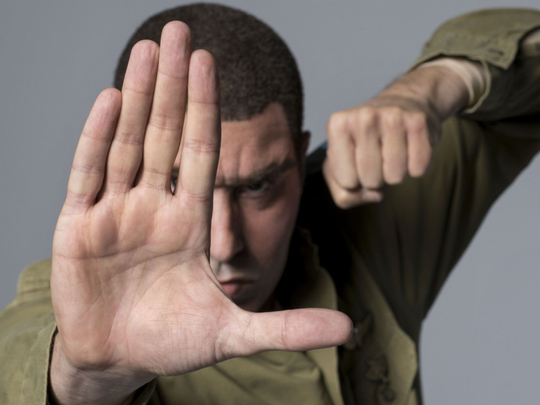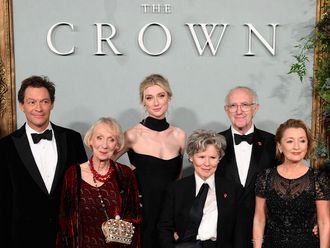
The fine-art expert Christy Cones was at work one day last year when a staffer from a British reality-TV company turned up at her gallery in Laguna Beach, California. Calling herself Alexis, the producer told her a hardened British ex-con had recently gotten out of prison and would like to talk about art. Could he come in and have an on-camera conversation with Cones?
The ex-con walked in the next day bearing face tattoos and a neck brace, Cones recalled in an interview. He then described to her his process of becoming an artist over 20 years in jail mainly by using his own bodily fluids. The man spent much of the hour-and-a-half trying to get her to acknowledge the artistic value of his banal works. At one point, he successfully solicited praise on paintings he said he made with his own waste. It was all a bid to evoke the art world’s pretension and self-seriousness.
The man was actually the British-born, Los Angeles-based comedian Sacha Baron Cohen, aka “Borat,” on a new quest to engage, expose and at times embarrass subjects around the country for a series called Who Is America. When the first of seven episodes debuted Sunday on Showtime, viewers got to see a fresh round of cringeworthy conversations, often with top political, media and tastemaking figures (in addition to Cones it includes Bernie Sanders, Dick Cheney, Ted Koppel, Trent Lott and current Republican Congressmen Dana Rohrabacher and Joe Wilson). All have no idea they’re being duped by one of several characters that Cohen plays in heavy make-up.
“Oh my God, it was all an act? He faked his tears?” Cones said when told by a reporter what had happened. She recovered a second later. “I don’t care. Am I supposed to say I’m embarrassed? All conversations about art are important.”
Who Is America attempts to expose the foibles and even hypocrisies of leaders on a wide range of subjects, including American foreign policy and gun rights, and the xenophobia of some Americans. (Journalists were given a preview of the early part of the first season.)
For liberals, the show serves as a kind of horror-comedy comfort food to those dismayed by current news. At the same time, it is likely to reinforce the perception of many conservatives who view Hollywood as a place of knee-jerk scorn that will stop at nothing to mock its audiences, particularly in middle America.
“I join a long list of American public personalities who have fallen victim to the evil, exploitive, sick ‘humour’ of the British ‘comedian’ Sacha Baron Cohen, enabled and sponsored by CBS/Showtime,” Palin wrote in a Facebook post this week, in which she said she flew across the country to be interviewed by someone claiming to be a disabled veteran. “I sat through a long ‘interview’ full of Hollywoodism’s disrespect and sarcasm,” she said, also noting the “sick nature that is media-slash-entertainment today.”
Who Is America was developed and shot in secrecy over at least the past 15 months. The first intimation of its existence came just two weeks ago when Showtime announced a mysterious series but wouldn’t say who its star was — a rarity in a time when the details of TV series are announced and followed by trade websites years in advance. Shortly after, Cohen sent out a short clip featuring Cheney autographing a waterboarding implement.
The program poses a risk for Showtime, opening it up not just to criticism but legal and financial exposure. Cohen was sued multiple times off the Borat film. (Disgraced Alabama politician Roy Moore, who said he was duped into appearing on camera, has already suggested he might sue.) Joe Walsh, a former Republican congressman from Illinois who was also snookered, has taken to Twitter to urge a Showtime boycott.
Yet the series also offers undeniable benefits for the network, putting Showtime in the cultural conversation at a time when it lacks as many buzzworthy shows as its counterparts. During the announcement of Emmy nominations on Thursday, Showtime (21 nominations) was dwarfed by larger rivals HBO (108) and Netflix (112).
Showtime chief David Nevins declined to comment on his decision to greenlight the series.
As he did on HBO’s early 2000s Da Ali G Show and later in the Borat and Bruno movies, Cohen again specialises in a kind of ambush squirm comedy, waylaying unsuspecting subjects with his outrageousness. Where Ali G often made Cohen’s characters the fools, leaving his targets a bemused straight men, America is more often intent on eliciting the foolishness in the targets themselves.
Cones’ segment is particularly likely to raise eyebrows. During one moment, she gamely honours his request that involves devoting a part of her body to art in a way that might make even the most stoic viewer avert their eyes.
“Oh my God, I did do that!” she said, at once horrified and slightly smiling as she recalled it. But she quickly recovered. “It will come around and get him. These things always come around.”
Cones said a crew of about five had showed up that day in spring 2017. They had initially walked into a gallery next door, but the owner declined to participate. She said she believed she was given $100 for use of the gallery space. She never heard from the crew again.
Other bits early in the season include the gun-rights advocate Philip Van Cleave and his surrogates, such as Walsh, Wilson and former Senate Majority Leader Trent Lott. They separately read PSAs for a (fake) program to give guns to preschoolers, at the prompting of a Cohen-played Israeli-commando character, as the show seeks to demonstrate the hypocrisy in a movement that claims it wants to protect children. Van Cleave even engages in a commercial promoting guns packaged as plush toys.
Though liberal figures like Sanders are also duped, the butt of the joke in those instances is usually the character who interrogates them, a conspiracy-minded right-wing blogger named Billy Wayne Ruddick (also the Palin interviewer). “I don’t know what you’re talking about,” Sanders says to Ruddick as he pushes an absurd scheme to raise up the disadvantaged.
Cohen does make fun of the left via one of his characters, a radical-progressive armchair activist named Nira Cain-N’Degeocello. At least early in the season, there are no Trump-administration officials in the show.
In addition to creating headaches for political and media figures, Who Is America is likely to trigger a debate about the bounds of acceptable television. Supporters of Cohen have long argued that he is a pioneering social-commentator, shrewdly playing off people’s egos to expose their true ugliness underneath. To his detractors, though, Cohen and his producers are just duplicitous tricksters who take advantage of others’ patience to further their political agenda.
“At the end of the day it will primarily be attack on us conservatives,” Walsh told CNN. “They’re going to go after us for our beliefs on guns and the flag.”
That debate will happen without its catalyst. Cohen appears to be opting out of all media. He has engaged in none of the traditional pre-show publicity appearances; his few responses have come in character (a Ruddick Twitter account took shots at Palin and demanded an apology). Reached by The Washington Post, Cohen’s publicist said the actor was shooting a new project and would not be available.
The actor and Showtime are deploying a kind of hardcore anti-publicity approach — an unconventional gambit that may give critics a lot of airtime but also makes them appear to be boxing against shadows.
Cones, at least, hopes to lure him into the open.
“Sacha Baron Cohen owes me a face-to-face meeting as compensation for his underhanded tactics and his preying on the vulnerable, especially by pretending to be someone who suffered when he probably hasn’t suffered a moment tin his life,” she said. “That’s the least he could do after putting me through this.
“That, and buy a painting.”













